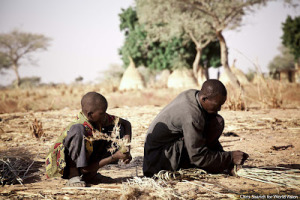Hungry Children Eat Locusts to Survive in West Africa Food Crisis
West Africa is currently in the grip of a desperate food crisis. With dying crops, poor rainfall and families still recovering from recent food shortages, the next harvest is still months away. Now, to make matters worse, the already struggling region has been hit by a devastating locust invasion.
A few weeks ago an invasion of locusts swarmed into crops in Mali and Niger, making life even harder for the families affected by the food crisis. As the locusts breed and hatch, they move in formations – threatening what’s left of the vital crops that families are so dependent upon. With not enough food to eat, children are resorting to catching and eating these locusts as food rations run dry.
Salissou, aged 11, has started to catch these locusts for his younger sisters to eat. The millet crop, which was the family’s only source of food has already been destroyed by locusts. Now the family have resorted to eating the insects to survive, but the locusts aren’t enough.
Salissou has five brothers and sisters. The youngest, Rashida, 2 is malnourished and sick. But she is one of the lucky ones, she is receiving treatment for malnutrition from World Vision. To receive this treatment though Salissou must walk more than six miles every two weeks to take Rashida to the nearest health centre. The journey is hard and it takes Salissou two- and-a-half-hours.
“If I carry her on my back, it’s difficult for me to walk and I get tired,” says Salissou. “It’s even harder if I’m hungry.”
Once at the center, the nurses give Salissou a life- saving high-nutrient supplement to feed to Rashida.
“I love my children; their life is my life,” Salissou’s father says. “I have to go to get something for them to eat.”

Salissou is sad because his father Adamour, will have to leave soon to try to find work in the city so he can buy food. Adamour says he can’t stay home looking at his children go hungry without doing something. He doesn’t know how his family will eat this year.
Where exactly are the locusts headed?
Since the infestation alert, there have been reports of at least 17 groups of locusts and small swarms arriving in Northern Niger. More mature swarms have also been seen further south, reaching pasture areas. Ground teams from the World Food Programme (WFP) have been brought in to try and control the swarms, which have so far proved successful on small groups.
In Northern Mali further swarms have also been reported. The control teams are finding it harder to operate in this area due to limited access and insecurity. These difficulties could hinder the control efforts, increasing the threat to crops as the locusts move further south on their journey.
There are already around 4 million children at risk of acute malnutrition because of the food crisis in West Africa and there are one million children who are currently malnourished and hungry. The added threat of locusts plaguing crops is only set to make living conditions worse for these children and families if it is not contained.
How you can help
World Vision will continue to feed malnourished children like Salissou’s little sister and help families recover from the crisis. Help a child receive life-saving treatment for just £35. Every pound raised will be being matched by the UK government, so your donations will go twice as far.
You might also like to consider sponsoring a child in Niger which will help children and communities live a hopeful future for the long-term.